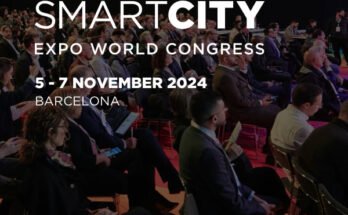The first panel of Rising Cities. Smart Future 2024 conference served as a vibrant kickoff, focusing on how digital innovation and intelligent infrastructures are reshaping our cities. Experts from various sectors including e-mobility, financial technology, and smart governance shared how they are integrating advanced technologies to enhance urban efficiency and sustainability.
We had some initial and main discussions with Glovo for a pilot project to see how we could come up with a solution for electrifying fleets, especially mopeds from 2001-2002 which were nearly falling apart. We started with 20 vehicles, and within three months, we managed to convince them and increase their delivery efficiency significantly, which is great for those in the field. Over time, their couriers managed to save approximately €70,000, which would have been spent on the fuel for the vehicles they operate—about 48,000 liters of fuel, whether gasoline or diesel. We also eliminated waiting times for charging, whether it’s electric or conventional fuel.
Regarding public administration and dialogue with them, especially from the beginning, what we are and what we bring is about innovation, and it is somewhat natural for there to be reluctance. We had timid discussions with several municipalities about coming up with electrification for existing fleets, particularly in waste management and sanitation. We can provide both infrastructure and vehicles as a package for municipalities, but the steps are timid, as I mentioned, partly because we are also in an election period. We are in advanced discussions with the city of Turku, Finland. We’ve seen a very big opening from Western Europe and more importantly from the United States; we have invitations from Los Angeles and New York. But just the financial logistics overturn us. Additionally, we have discussions with Montevideo, Buenos Aires, and Lagos, Nigeria. We are testing the viability of our product; we look at Turku where the average winter temperature is -25 or look towards Montevideo or Buenos Aires where we already talk about other temperatures.Read more aboutRising Cities. Smart Future 2024: Smart Tech Session read more
I firmly believe that financial technology is not only viable but essential for the actualization of the Green City concept. I am specifically referring to innovative financial technologies that bring added value, such as crowdfunding and green bonds, which can catalyze the development of a truly sustainable Green City. Furthermore, blockchain technology could attract investments through enhanced security, traceability, and accessibility, thus fostering a robust investment environment in sustainable development. Although blockchain is often automatically associated with cryptocurrencies, it is, in fact, a distinct and innovative technology that supports numerous functionalities, including sustainability. Within the financial sector’s Green Zone, blockchain may consume varying amounts of resources, but fundamentally, the technology—particularly its ecological applications—offers substantial benefits. It facilitates remarkably easy access for people within this financial sector and ensures a level of transparency that is essential for everyone. Beyond traditional finance, blockchain can streamline processes from instant financial transactions with various currencies to tokenizing assets like documents and property ownership. Thanks to its decentralized nature, individuals can have blockchain-based ownership documents for houses or transport documents that are instantly verifiable by any organization, thus ensuring traceability.
Looking ahead, I envisage that within five to ten years, we could witness the emergence of three to four pivotal technologies that would form the foundation of what we might call a Smart City. The core of this development would be advanced communication and 5G networks, which would integrate every aspect of a Smart City. The Internet of Things, for instance, is set to revolutionize how we interact with our urban environment, with devices and urban infrastructure like pollution sensors and smart traffic lights delivering real-time data to enhance city life. Additionally, Artificial Intelligence could play a crucial role in optimizing city functions such as traffic management by analyzing patterns and automating necessary adjustments. Another critical technology, the Smart Grid, which addresses energy concerns, will likely be indispensable. By instantly adapting to energy demands, Smart Grids could facilitate the realization of a Smart City. I believe these technologies will collectively form the essential backbone necessary to develop a fully functional Smart City.
Our project, Smarter Finance for Families, and its continuation, Smarter Free EU, encapsulate much of our current focus: fostering a green economy through elevated standards, particularly within the banking sector. By setting high benchmarks and offering preferential green financing for the most sustainable homes and buildings, we incentivize innovation and mitigate risks associated with rapid market transformation. Our commitment to maintaining these standards was underscored in a recent productive meeting in Brussels with key members of the European Commission and banking associations. We confronted the misconception that Romania lacks sufficient compliant projects by presenting evidence of €3 billion worth of high-standard green homes, with the Romanian standards recognized as the highest in Europe. Additionally, our consortium has certified green homes valued at about €10 billion.
Despite the prevalence of unsustainable buildings globally, establishing high standards takes time, as does the process of renovating or constructing new buildings. Upon my arrival in Romania, securing quality office space was challenging, whether green or not. Now, leading builders compete, much like in an ‘Olympics’ of green building, to achieve the highest sustainability scores. The shift is evident; the residential sector, though slower, is catching up, with outstanding builders showcased in today’s panel discussions.
Regarding financing, it is imperative that any state-supported preferential financing in Romania—or internationally—demands rigorous safety, environmental, and energy standards. The extensive state subsidies that have historically kept energy costs artificially low must be reevaluated to encourage more sustainable energy consumption and reduce energy poverty.
Moreover, I challenge the notion that energy efficiency is cost-prohibitive and that benefits are only long-term. Bankers, often vilified, can be champions of sustainability by offering financing that supports ambitious green projects. For instance, purchasing a green home or an electric car through financing changes the economic equation—the upfront price is mitigated by lower ongoing costs, exemplified by homes in our program that have yielded significant energy savings. This approach not only promotes sustainability but also introduces a practical financial strategy that benefits consumers directly.
Good morning, and thank you for the invitation. In brief, charger.ro is a new name and brand in the market, launched just last March. As a startup and an integrator of solutions and services, we pride ourselves on providing new energy-efficient solutions that enhance our clients’ operations. Our portfolio includes three verticals: charging solutions for electric vehicles, photovoltaic systems, and Smart City solutions—a term that may seem ambiguous and fancy but translates into practical applications like smart urban furniture, air quality sensors, and other devices for urban spaces. Despite being a newcomer, Charger is backed by a team with a decade of experience in architectural design and urban regeneration. Since 2019, we’ve collaborated with the World Bank on national projects and have engaged in numerous discussions at European and national levels about turning our designs into reality. Charger aims to provide a comprehensive experience, assisting non-technical clients from concept through to the implementation of solutions. We work with a diverse range of 70 European and national manufacturers, covering all our service verticals, and take care of installation and management of, for example, charging stations. From start to finish, we’re there for our clients.
Price triggers, particularly in photovoltaic systems, play a major role in reducing operational costs. Current legislation mandates, for instance, that new constructions in certain areas include a percentage of electrically equipped parking spaces, pushing the industry towards sustainable solutions. Last year, 90% of our portfolio comprised companies from logistics and office sectors, with the hospitality industry also keen on adopting innovative and energy-efficient solutions out of enthusiasm rather than just financial necessity. We offer operational leasing options in collaboration with Autonom, allowing businesses to discover and implement optimal solutions seamlessly, supporting them every step of the way.
The concept of Smart gov was born from the challenges of interacting with public administration, such as long queues, a lack of digital applications, and remote interaction difficulties. The state demands much from us without providing the necessary tools. For instance, paying taxes is made cumbersome by inefficient governmental processes. At Gov-Smart, we’ve developed a ‘Governance as a service’ model, where public institutions looking to offer digitized services to their citizens can rely on us for efficient administration. We alleviate the workload on public officials, help them avoid errors in citizen interactions, and bring them closer to the community. Just yesterday, we digitized three out of 200 town halls in Romania, demonstrating our technology’s scalability. We also offer a transparency module, showing public budget execution and procurement, embodying a holistic approach that simplifies public administration by reducing the need for in-person visits. Our documents of high importance are secured on the blockchain, ensuring immutability. Currently, we serve two town halls contractually, with plans to expand significantly next year, including initiatives in the United States through discussions with the Arizona Technology Council—a gateway to introducing our services to the American market.
Ionel Craciun, Business Development Manager CEE at Vantage Towers Romania
We are an infrastructure company that shares assets with mobile network developers, and our use cases range from security and critical infrastructure to airspace surveillance, delivery, and more. This approach significantly reduces environmental impact as it allows multiple operators to access a single investment. In Romania, Vantage Towers operates over 2300 communication points that support smart metering and smart locks, which can be controlled remotely, enhancing security. This model is crucial for the Romanian market, which faces significant challenges in communications. The high quality of services combined with low costs places immense pressure on the industry.
Moreover, as we discuss smart cities, I would prefer to speak about smart communities because, in Romania, there is a natural tendency to upgrade the Smart City mechanism. However, we must not lose sight of the fact that we are a cohesive whole, with both urban and rural areas needing attention. One of our goals is to bridge what we call the ‘Modern digital gap’ between urban and rural areas. Romania is experiencing a historical moment in telecommunications that sounds promising from both communication and technological perspectives. The recent completion of the 5G auction has placed operators at the forefront of 5G communication implementations, which is immensely beneficial for the country, consumers, and the enterprise environment.
Our shared infrastructure model provides a cost-effective solution that makes the ecosystem more accessible, efficient, and easier to implement. Although discussions often revolve around financial aspects, the speed of implementation is also crucial. Compared to other international markets like China and the USA, Europe, and Romania are lagging behind, so these new regulatory frameworks are essential for accelerating development and recovery. With our support, we are optimistic about maintaining Romania’s status as a competitive player in connectivity and coverage, which should continue to attract investors and create opportunities for consumers to lead better, more sustainable lives within these evolving smart city ecosystems.
We use cookies for keeping our website reliable and secure, personalising content and ads, providing social media features and to analyse how our website is used.



